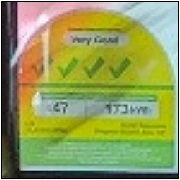- GlassEye-Boy
- Jul 12, 2001
-
|
The US imports less than 5% of it's steel from China, and shipping ain't coming back to the US, nice try at trying to out trump trump, not sure if it's gonna get Biden any votes.
|
 #
?
Apr 18, 2024 14:53
#
?
Apr 18, 2024 14:53
|
|
- Adbot
-
ADBOT LOVES YOU
|

|
|
#
?
May 2, 2024 18:21
|
|
- tractor fanatic
- Sep 9, 2005
-

-
Pillbug
|
The US has never had a big commercial shipbuilding industry, the military shipbuilding problem is the same grift issue that's infecting the rest of the MIC
|
 #
?
Apr 18, 2024 15:20
#
?
Apr 18, 2024 15:20
|
|
- Mandel Brotset
- Jan 1, 2024
-

|
this all just sounds hella whiny
this is the official rhetorical mode of the greatest empire to ever exist
|
 #
?
Apr 18, 2024 15:24
#
?
Apr 18, 2024 15:24
|
|
- bedpan
- Apr 23, 2008
-

|
i'm going to build all of my ocean-going vessels at shipyards on the great lakes
|
 #
?
Apr 18, 2024 16:38
#
?
Apr 18, 2024 16:38
|
|
- corona familiar
- Aug 13, 2021
-

|
it's non-competitive if we get owned trying to compete against it
|
 #
?
Apr 18, 2024 18:17
#
?
Apr 18, 2024 18:17
|
|
- Palladium
- May 8, 2012
-

Very Good
✔️✔️✔️✔️
|
The US has never had a big commercial shipbuilding industry, the military shipbuilding problem is the same grift issue that's infecting the rest of the MIC
lol shouldn't they sanction australia for being a subcontractor building their hilariously overpriced lovely military boats then
Palladium has issued a correction as of 18:46 on Apr 18, 2024
|
 #
?
Apr 18, 2024 18:42
#
?
Apr 18, 2024 18:42
|
|
- Danann
- Aug 4, 2013
-

|
https://www.bloomberg.com/opinion/articles/2024-04-18/the-us-s-new-trade-weapon-against-china-is-carbon?srnd=homepage-americas
quote:
bloomberg.com
The US's New Trade Weapon Against China Is Carbon
Liam Denning
6–8 minutes
Perhaps in time we’ll look back on this week as when a death blow was delivered in Manhattan to the World Trade Organization. On Tuesday, White House climate envoy John Podesta delivered bombshell remarks on climate policy and trade at a conference organized by Columbia University’s Center on Global Energy Policy. Such as:
Right now, our existing trade policies and the international rules that govern them don’t pay enough attention to the emissions embodied in tradeable goods … Instead, we need a smart, 21st century-approach to climate and trade policy that launches a “race to the top” for climate action.
That’s fighting talk that comes after a lot of other fighting talk, including Treasury Secretary Janet Yellen’s recent threat of more tariffs against China. Podesta has laid out the clearest declaration yet of the Biden administration’s willingness to upend global trading rules — which the US fostered — to achieve its twin objectives of limiting carbon emissions and Chinese dominance of key industries. As with any clash, there will be collateral damage, possibly to the energy transition itself.
Decarbonization today relies to an overwhelming degree on reductions in the price of clean technologies like solar panels and batteries due to Chinese industrial policy turbocharging the country’s factories. The current angst about world-beating Chinese electric vehicles owes much to the quality and cost of those vehicles.
Great for the planet, up to a point, but less so for workers elsewhere competing with those Chinese factories. Worse, there are credible accusations of some of this technology being produced with forced labor, accusations denied by Beijing but which have drawn sanctions nonetheless.
It is no accident that President Joe Biden’s signature climate policy, the Inflation Reduction Act, is tied explicitly to reshoring US jobs and supply chains. Indeed, that is likely the only way such policy could pass in Congress — and only barely — in a country where a federal carbon tax remains all but unmentionable and Biden’s presumptive presidential opponent still has a major problem with “wind.”
Podesta essentially called for the creation of a new trading system that protects green subsidies in the US, and in potential partners aligned with Washington, both from legal challenges and so-called carbon leakage. The latter is where a country prices carbon in some way within its borders, raising the cost of doing business there, only to find its domestic manufacturers undercut by cheaper imports from a country with looser climate policies.
Podesta rhetorically upped the ante by referring to this as “climate dumping.” He also pointedly derided the idea that China, of all countries, can legitimately challenge US cleantech subsidies at the WTO, calling it “beyond ironic.” There is also some irony in the fact that the US — the country that led the foundation of the postwar trading system that spawned the WTO — blocked appointees to its appellate body in protest at rulings that went against it, effectively gumming it up.
There are legitimate reasons to prevent countries undercutting each other on emissions given multi-speed regimes. The European Union’s Carbon Border Adjustment Mechanism, which has just started to roll out, is aimed at this and, while the US disagrees with Brussels’ method, Podesta clearly sees some common ground for a new coalition of like-minded countries. The EU is also getting more nervous about Chinese competition — see Brussels’ swift use of its newly instituted foreign subsidies regulation.
There is even some common ground here, at the margin, with Republicans. Senator Bill Cassidy of Louisiana’s proposed Foreign Pollution Fee Act would effectively, and convolutedly, impose a carbon border tax on selected imports with higher carbon intensity than US goods, aimed explicitly at China (see this). Suspicion of China is one of the very few areas of bipartisan agreement left.
This mixing of economic, geopolitical and environmental imperatives speaks to a world where postwar norms are being tested to destruction, not least in Ukraine. The WTO, underpinning free trade, is one of those norms. The US led their establishment largely as a means to contain the Soviets and it is striking that Cassidy referenced this with regards to his bill and its impact on China. ClearView Energy Partners, an analytics firm, has long pointed out the lower carbon intensity and higher income of Washington-aligned nations and groups like the G7 as a potential organizing principal for new trading arrangements (see the chart below, derived from ClearView’s analysis and taken from a prior column).
It helps, of course, that China itself used subsidies and barriers, along with cheap labor, to establish structural competitive advantages vis-a-vis Western manufacturers; and the country’s reliance on coal-fired power, also embedded in its cleantech exports, now presents a structural weakness that can be exploited.
To be clear, the goal of trade policy should be to foster sustainable economic development. As Dan Esty, director of the Yale Center for Environmental Law and Policy, pointed out in a recent podcast, that goal is right there in the opening paragraph of the WTO’s founding document, the Marrakesh Agreement. Cleaning up your own industries while consumers buy their appliances from factories tethered to a coal mine is a non-starter over the long term.
Yet, almost exactly 30 years on from Marrakesh, the 21st century project of saving the planet is now bound inextricably to the age-old contest of who runs said planet. That means the energy transition, a beguilingly smooth formulation, comes with growing friction. Our desire to not only fix the climate but also fix the harms wrought by offshoring will impose extra costs in what amounts to a vast renovation job for our infrastructure and industrial systems. To cite one specific area, the cheapest route to decarbonizing transportation would be to flood the market with Chinese EVs. It would also be the fastest route out of office for the administration allowing it. In blunt political terms, you can’t have an energy transition that relies on (alleged) forced labor in China and busted labor in the Rust Belt.
there is nothing left in the tank except for continuous complaints to china's manager
|
 #
?
Apr 19, 2024 05:41
#
?
Apr 19, 2024 05:41
|
|
- stephenthinkpad
- Jan 2, 2020
-
|
Does Biden even remember he tried to push IPEF and it didn't go anywhere?
|
 #
?
Apr 19, 2024 05:51
#
?
Apr 19, 2024 05:51
|
|
- corona familiar
- Aug 13, 2021
-

|
drat I wish I could lie so confidently and get literally every media outlet in the world to republish my lies unedited with an "(alleged)" in front of them
|
 #
?
Apr 19, 2024 06:10
#
?
Apr 19, 2024 06:10
|
|
- Eminent DNS
- May 28, 2007
-

|
The US government could have saved hundreds of dollars in printing supplies by just calling it the deflation act
|
 #
?
Apr 19, 2024 07:17
#
?
Apr 19, 2024 07:17
|
|
- Homeless Friend
- Jul 16, 2007
-

|
let's go russia sanctions 2.0
|
 #
?
Apr 19, 2024 07:22
#
?
Apr 19, 2024 07:22
|
|
- GlassEye-Boy
- Jul 12, 2001
-
|
profits slumped 40% and it’s only growing market was….China. when the Chinese cut out asml from their supply chains the company is going under.
|
 #
?
Apr 19, 2024 15:13
#
?
Apr 19, 2024 15:13
|
|
- mawarannahr
- May 21, 2019
-

|
sucks to your asml 🤓
|
 #
?
Apr 19, 2024 16:30
#
?
Apr 19, 2024 16:30
|
|
- mawarannahr
- May 21, 2019
-

|
also lol
TSMC expects customers to pay more for chips fabbed overseas
www.theregister.com posted:
TSMC boss C C Wei says customers who want to fabricate in the chip giant's non-Taiwan facilities will need share the cost by paying more.
During the Q&A part of TSMC's Q1 earnings call, an analyst asked the CEO how the world's largest chip contract maker would cope with rising expenses, such as electricity, in order to achieve the targeted 53 percent gross margin in 2025.
The analyst suggested that if the cost of doing business was going up and could erode gross margin, the only way to offset that would be to perform price hikes.
Although Wei said he couldn't disclose pricing strategies as such information is confidential, he did elaborate on how pricing would work at fabs with higher operation expenses. "We do encounter some kind of higher cost in the overseas or even recently, the inflation and the electricity."
"We expect our customers to share some of the higher cost with us, and we already started our discussion with our customers," he continued, confirming that higher production costs would be at least partly funded by higher prices.
Customers, however, wouldn't be paying more and getting nothing in return, claimed Wei.
"As I said, for the overseas fab, we want to share our value, which also includes the flexibility of geopolitical location or something like that," he said. "If my customer requests to be in some certain area, then definitely, TSMC and the customer has to share the incremental cost."
Geopolitics are a chief reason why TSMC is setting up shop in the US in the first place, in spite of American fabs being more expensive. China has claimed Taiwan rightfully belongs under its control ever since the end of the Chinese Civil War in 1949, which ended with the Chinese Communist Party establishing the People's Republic of China on the mainland, and the exile of the Nationalist or Kuomintang-led Republic of China to Taiwan.
Although China has never made a full-blown attempt to seize Taiwan and dismantle its rival once and for all, fears of a Chinese invasion have increased in recent years, especially since Taiwan became an extremely important strategic asset thanks to TSMC's cutting-edge fabs. A successful invasion may cut off the West from TSMC's chips, but even a failed attempt could cause serious damage.
That's essentially the geopolitical value Wei refers to with overseas fabs, because they're probably not going to be the target of military operations any time soon. Of course, since building fabs in places like the US isn't the best choice financially, TSMC has received billions of dollars in subsidies.
Wei didn't specify exactly how much more expensive its fabs abroad would be, but considering TSMC probably wouldn't have built them without receiving $11 billion in grants and loans, we can guess the difference could be quite substantial. ®
|
 #
?
Apr 19, 2024 16:31
#
?
Apr 19, 2024 16:31
|
|
- stephenthinkpad
- Jan 2, 2020
-
|
If you treat the semiconductor industry like a military industry of course you would have to pay your silicon products 2x, 3x more than the Chinese version, just like all other military hardware.
BTW new Huawei P70 phone dropped, but its only 10% faster than the chip in Mate 60 Pro so it's not some bottleneck breakthrough. Good job making steady progress nonetheless.
|
 #
?
Apr 19, 2024 16:41
#
?
Apr 19, 2024 16:41
|
|
- genericnick
- Dec 26, 2012
-

|
rival, lmao
|
 #
?
Apr 19, 2024 17:49
#
?
Apr 19, 2024 17:49
|
|
- crepeface
- Nov 5, 2004
-

r*p*f*c*
|
guys! guys! xi jinping gave us a flag!!
https://www.youtube.com/watch?v=EeINrpGWEgk
|
 #
?
Apr 20, 2024 02:42
#
?
Apr 20, 2024 02:42
|
|
- platzapS
- Aug 4, 2007
-


|
From a Washington Post-owned mag that endorsed Hillary Clinton, but hard to interpret except as pro-Chinese boosterism.
---------
Forget About Chips—China Is Coming for Ships
Here are five ways in which Beijing’s shipbuilding sector shows how China intends to gain global economic dominance in key industrial fields.
1. China is playing the long game.
Shipbuilding may not often make the headlines, but the industry is far from a small one: Globally, shipyards sell around $150 billion worth of vessels every year, roughly double the market for wind turbines. China’s shipbuilding strategy follows a familiar playbook, whereby Beijing aims to flood the world with cheap products, drive foreign competition out of business, and gain global dominance. Money is no object—while Western firms work with just-in-time, revenue-seeking frameworks, their Chinese competitors worry more about building capacity at all costs than being profitable.
China’s shipbuilders also have a financial ace up their sleeve. They benefit from state largesse to an extent that would be unthinkable in capitalist economies The Chinese government pays 13 to 20 percent of the construction costs of a typical cargo vessel. Low-cost credit also helps: From 2010 to 2018, Chinese state-owned financial institutions granted domestic shipbuilders cheap loans amounting to at least $127 billion.
The results are clear, with Chinese shipyards producing more than half of the world’s ships each year, up from only 12 percent only two decades ago. This sky-high growth looks far from over—China’s shipbuilding output rose by nearly 12 percent in 2023, and the country appears set to produce 70 to 80 percent of all new oil tankers and dry bulk carriers in the coming three years.
2. Beijing’s goal is to build Western-proof supply chains.
The Western debate on decoupling and de-risking usually eclipses an inconvenient truth: China is already the world leader in isolating its supply chains. In industries that Beijing sees as critical, the country has long aimed at building Western-proof supply chains that shield China from potential Western sanctions. Considering that shipbuilding is crucial for global commerce, it is not surprising that the sector represents a priority area for Beijing’s de-risking efforts. For the latest evidence, look no further than the Chinese Academy of Engineering, which published a paper in February assessing the vulnerabilities of Chinese shipbuilders to Western sanctions.
In shipbuilding, China’s sanctions-proofing strategy rests on two pillars. The first has to do with self-sufficiency. Chinese firms produce around 55 percent of global steel output, ensuring that domestic shipyards never run out of the commodity. And China’s reach spans across the entire supply chain for shipping gadgetry. Chinese businesses manufacture 96 percent of the world’s dry cargo shipping containers, and a single Chinese firm, ZPMC, claims that it supplies 70 percent of the world’s cargo cranes.
If this was not enough, Beijing has also built an edge in shipbuilding finance; China Exim and the Bank of China count among the most important actors on the global shipping finance scene.
The second pillar of China’s sanctions-proofing efforts is to keep foreigners out of shipbuilding. Beijing’s plans in the field date back to 2001, when the Communist Party leadership restricted foreign investments in the sector. Today, foreign-owned firms manufacture only about 5 percent of Chinese-made ships, shielding the sector from unfriendly interference. In 2006, Beijing also made shipbuilding one of the seven sectors where state-owned firms are required to retain a dominant position over private competitors—even Chinese ones. As a result, state-owned firms manufacture around two-thirds of Chinese-built ships, giving party leadership tight control over shipyard activity.
3. The line between civilian and military applications is blurry.
The sectors that China has identified in its Made In China 2025 document share a common feature: They have national security implications. The shipbuilding sector is no exception to this rule. As U.S. Navy Secretary Carlos Del Toro puts it, “History proves that, in the long run, there has never been a great naval power that wasn’t also a maritime power—a commercial shipbuilding and global shipping power.” 
China’s shipbuilding jewel, China State Shipbuilding Corporation (CSSC), provides an illustration of such civil-military fusion. In addition to building one-fifth of the world’s cargo vessels, the company is also a major supplier of warships for the Chinese navy.
This situation has two implications. First, those Western firms that work with CSSC may be financing the People’s Liberation Army’s naval buildup; more than 70 percent of the orders at CSSC’s flagship Hudong-Zhonghua shipyard are from foreign shipowners, many of them Western. Second, in case of war—say, over Taiwan—the Chinese leadership would be able to quickly repurpose shipyards to build and repair warships, giving Beijing a naval edge.
4. Shipping involves intelligence and standards.
China’s industrial long game is not only about building overcapacity, but also about collecting intelligence and setting technical standards. This may sound familiar: Fears about the ability of Huawei-made telecommunications gear to spy on Western military installations were the reason why the United States and some of its allies banned the company from their 5G markets.
Concerns around China’s plans to collect intelligence in the shipping sector mainly center around Logink, a software that tracks cargo shipments around the world. Beijing’s generous policy of distributing the software for free means that the tool is already in use in many of the world’s biggest ports, including Hamburg, Germany; Rotterdam, the Netherlands; Jebel Ali, United Arab Emirates; Busan, South Korea; and Tokyo-Yokohama. U.S. officials worry that the seemingly innocuous software could help Beijing gain insights into military shipments and gather sensitive commercial information.
As if this was not enough, shipping insiders note that Logink’s success might give China a first-mover advantage to set technical standards for shipping logistics: If the software becomes the gold standard in the field, it will become much harder to replace with a privacy-friendly competitor.
5. Western economies will be hard-pressed to respond to China’s shipbuilding dominance.
China’s domination of the shipbuilding sector offers an illustration of two key challenges for Western de-risking plans.
The first has to do with collaboration among like-minded allies. On paper, cooperation among the United States, Europe, Japan, and other democracies is all well and great. In practice, however, such collaboration is tricky: For all the talk of the need for unity, Western countries remain economic competitors. Other than China, the only two major shipbuilding powers left in the world are South Korea and Japan. In theory, building a Western alliance promoting South Korean and Japanese shipyards would make sense, but this will be easier said than done as Western economies all seek to defend what’s left of their domestic industries.
The second challenge entails convincing global shipping firms to stop buying cheap Chinese vessels. In practice, this means persuading executives that they need to do their patriotic duty by buying more expensive ships. Good luck with that.
-------
Agathe Demarais is a columnist at Foreign Policy, a senior policy fellow on geoeconomics at the European Council on Foreign Relations, and the author of Backfire: How Sanctions Reshape the World Against U.S. Interests.
platzapS has issued a correction as of 04:13 on Apr 20, 2024
|
 #
?
Apr 20, 2024 04:03
#
?
Apr 20, 2024 04:03
|
|
- Danann
- Aug 4, 2013
-

|
ok shipbuilding sounds good and all but have you considered that the west has marine insurance and brics does not
|
 #
?
Apr 20, 2024 04:06
#
?
Apr 20, 2024 04:06
|
|
- Stringent
- Dec 22, 2004
-

image text goes here
|
From a Washington Post-owned mag that endorsed Hillary Clinton, but hard to interpret except as pro-Chinese boosterism.
---------
Forget About Chips—China Is Coming for Ships
Here are five ways in which Beijing’s shipbuilding sector shows how China intends to gain global economic dominance in key industrial fields.
1. China is playing the long game.
Money is no object—while Western firms work with just-in-time, revenue-seeking frameworks, their Chinese competitors worry more about building capacity at all costs than being profitable.
China’s shipbuilders also have a financial ace up their sleeve. They benefit from state largesse to an extent that would be unthinkable in capitalist economies The Chinese government pays 13 to 20 percent of the construction costs of a typical cargo vessel. Low-cost credit also helps: From 2010 to 2018, Chinese state-owned financial institutions granted domestic shipbuilders cheap loans amounting to at least $127 billion.
you love to see it
|
 #
?
Apr 20, 2024 04:11
#
?
Apr 20, 2024 04:11
|
|
- Danann
- Aug 4, 2013
-

|
https://twitter.com/TripInChina/status/1780116160266027393
incredible things are happening in china
|
 #
?
Apr 20, 2024 04:13
#
?
Apr 20, 2024 04:13
|
|
- Palladium
- May 8, 2012
-

Very Good
✔️✔️✔️✔️
|
*getting owned by china's relative chump change*
US: nevertheless, spending $200B+ yearly on overseas bases and and another $200B+ yearly on the VA must be more efficient than whatever the orientals are perfidiously doing
|
 #
?
Apr 20, 2024 04:30
#
?
Apr 20, 2024 04:30
|
|
- this allusion meant
- Apr 9, 2006
-
|
From a Washington Post-owned mag that endorsed Hillary Clinton, but hard to interpret except as pro-Chinese boosterism.
---------
Forget About Chips—China Is Coming for Ships
Here are five ways in which Beijing’s shipbuilding sector shows how China intends to gain global economic dominance in key industrial fields.
1. China is playing the long game.
Shipbuilding may not often make the headlines, but the industry is far from a small one: Globally, shipyards sell around $150 billion worth of vessels every year, roughly double the market for wind turbines. China’s shipbuilding strategy follows a familiar playbook, whereby Beijing aims to flood the world with cheap products, drive foreign competition out of business, and gain global dominance. Money is no object—while Western firms work with just-in-time, revenue-seeking frameworks, their Chinese competitors worry more about building capacity at all costs than being profitable.
China’s shipbuilders also have a financial ace up their sleeve. They benefit from state largesse to an extent that would be unthinkable in capitalist economies The Chinese government pays 13 to 20 percent of the construction costs of a typical cargo vessel. Low-cost credit also helps: From 2010 to 2018, Chinese state-owned financial institutions granted domestic shipbuilders cheap loans amounting to at least $127 billion.
The results are clear, with Chinese shipyards producing more than half of the world’s ships each year, up from only 12 percent only two decades ago. This sky-high growth looks far from over—China’s shipbuilding output rose by nearly 12 percent in 2023, and the country appears set to produce 70 to 80 percent of all new oil tankers and dry bulk carriers in the coming three years.
2. Beijing’s goal is to build Western-proof supply chains.
The Western debate on decoupling and de-risking usually eclipses an inconvenient truth: China is already the world leader in isolating its supply chains. In industries that Beijing sees as critical, the country has long aimed at building Western-proof supply chains that shield China from potential Western sanctions. Considering that shipbuilding is crucial for global commerce, it is not surprising that the sector represents a priority area for Beijing’s de-risking efforts. For the latest evidence, look no further than the Chinese Academy of Engineering, which published a paper in February assessing the vulnerabilities of Chinese shipbuilders to Western sanctions.
In shipbuilding, China’s sanctions-proofing strategy rests on two pillars. The first has to do with self-sufficiency. Chinese firms produce around 55 percent of global steel output, ensuring that domestic shipyards never run out of the commodity. And China’s reach spans across the entire supply chain for shipping gadgetry. Chinese businesses manufacture 96 percent of the world’s dry cargo shipping containers, and a single Chinese firm, ZPMC, claims that it supplies 70 percent of the world’s cargo cranes.
If this was not enough, Beijing has also built an edge in shipbuilding finance; China Exim and the Bank of China count among the most important actors on the global shipping finance scene.
The second pillar of China’s sanctions-proofing efforts is to keep foreigners out of shipbuilding. Beijing’s plans in the field date back to 2001, when the Communist Party leadership restricted foreign investments in the sector. Today, foreign-owned firms manufacture only about 5 percent of Chinese-made ships, shielding the sector from unfriendly interference. In 2006, Beijing also made shipbuilding one of the seven sectors where state-owned firms are required to retain a dominant position over private competitors—even Chinese ones. As a result, state-owned firms manufacture around two-thirds of Chinese-built ships, giving party leadership tight control over shipyard activity.
3. The line between civilian and military applications is blurry.
The sectors that China has identified in its Made In China 2025 document share a common feature: They have national security implications. The shipbuilding sector is no exception to this rule. As U.S. Navy Secretary Carlos Del Toro puts it, “History proves that, in the long run, there has never been a great naval power that wasn’t also a maritime power—a commercial shipbuilding and global shipping power.” 
China’s shipbuilding jewel, China State Shipbuilding Corporation (CSSC), provides an illustration of such civil-military fusion. In addition to building one-fifth of the world’s cargo vessels, the company is also a major supplier of warships for the Chinese navy.
This situation has two implications. First, those Western firms that work with CSSC may be financing the People’s Liberation Army’s naval buildup; more than 70 percent of the orders at CSSC’s flagship Hudong-Zhonghua shipyard are from foreign shipowners, many of them Western. Second, in case of war—say, over Taiwan—the Chinese leadership would be able to quickly repurpose shipyards to build and repair warships, giving Beijing a naval edge.
4. Shipping involves intelligence and standards.
China’s industrial long game is not only about building overcapacity, but also about collecting intelligence and setting technical standards. This may sound familiar: Fears about the ability of Huawei-made telecommunications gear to spy on Western military installations were the reason why the United States and some of its allies banned the company from their 5G markets.
Concerns around China’s plans to collect intelligence in the shipping sector mainly center around Logink, a software that tracks cargo shipments around the world. Beijing’s generous policy of distributing the software for free means that the tool is already in use in many of the world’s biggest ports, including Hamburg, Germany; Rotterdam, the Netherlands; Jebel Ali, United Arab Emirates; Busan, South Korea; and Tokyo-Yokohama. U.S. officials worry that the seemingly innocuous software could help Beijing gain insights into military shipments and gather sensitive commercial information.
As if this was not enough, shipping insiders note that Logink’s success might give China a first-mover advantage to set technical standards for shipping logistics: If the software becomes the gold standard in the field, it will become much harder to replace with a privacy-friendly competitor.
5. Western economies will be hard-pressed to respond to China’s shipbuilding dominance.
China’s domination of the shipbuilding sector offers an illustration of two key challenges for Western de-risking plans.
The first has to do with collaboration among like-minded allies. On paper, cooperation among the United States, Europe, Japan, and other democracies is all well and great. In practice, however, such collaboration is tricky: For all the talk of the need for unity, Western countries remain economic competitors. Other than China, the only two major shipbuilding powers left in the world are South Korea and Japan. In theory, building a Western alliance promoting South Korean and Japanese shipyards would make sense, but this will be easier said than done as Western economies all seek to defend what’s left of their domestic industries.
The second challenge entails convincing global shipping firms to stop buying cheap Chinese vessels. In practice, this means persuading executives that they need to do their patriotic duty by buying more expensive ships. Good luck with that.
-------
Agathe Demarais is a columnist at Foreign Policy, a senior policy fellow on geoeconomics at the European Council on Foreign Relations, and the author of Backfire: How Sanctions Reshape the World Against U.S. Interests.
why are they treating this as some kind of weird new thing? didn't e.g. the british empire take care to always carve out trade rules to maintain a dominant naval capacity even as they shifted back and forth between free trade and protectionist policies? wasn't one of the most influential pieces of china doomerist media at the end of the 20th century basically about the limitations of powers that don't pursue widespread oceangoing engagement with the world? do they think that other countries don't consider security implications in these policies at all, i.e. that america would be fine with a non-western company buying large firms in the sectors we consider strategically key, like boeing? and forgetting about chips seems absurd since that's the field where more or less everyone is just open about these motivations being front and center in their policies
|
 #
?
Apr 20, 2024 05:16
#
?
Apr 20, 2024 05:16
|
|
- gradenko_2000
- Oct 5, 2010
-

HELL SERPENT
-
Lipstick Apathy
|
quote:Forget About Chips—China Is Coming for Ships
thread title
|
 #
?
Apr 20, 2024 05:24
#
?
Apr 20, 2024 05:24
|
|
- Man Musk
- Jan 13, 2010
-

|
Not sure I'm sold. Isn't the CCP being short-sighted and infecund?
|
 #
?
Apr 20, 2024 05:32
#
?
Apr 20, 2024 05:32
|
|
- Ghost Leviathan
- Mar 2, 2017
-

Exploration is ill-advised.
|
why are they treating this as some kind of weird new thing? didn't e.g. the british empire take care to always carve out trade rules to maintain a dominant naval capacity even as they shifted back and forth between free trade and protectionist policies? wasn't one of the most influential pieces of china doomerist media at the end of the 20th century basically about the limitations of powers that don't pursue widespread oceangoing engagement with the world? do they think that other countries don't consider security implications in these policies at all, i.e. that america would be fine with a non-western company buying large firms in the sectors we consider strategically key, like boeing? and forgetting about chips seems absurd since that's the field where more or less everyone is just open about these motivations being front and center in their policies
They've completely forgotten what geopolitics actually are, and believe wholeheartedly in The Free Market and competition of frictionless spheres in a void.
|
 #
?
Apr 20, 2024 05:54
#
?
Apr 20, 2024 05:54
|
|
- Palladium
- May 8, 2012
-

Very Good
✔️✔️✔️✔️
|
They've completely forgotten what geopolitics actually are, and believe wholeheartedly in The Free Market and competition of frictionless spheres in a void.
this is what happens in a Very Coherent Ideology combining "everyone is innately greedy and selfish" with "no, not like that"
|
 #
?
Apr 20, 2024 05:56
#
?
Apr 20, 2024 05:56
|
|
- AmyL
- Aug 8, 2013
-

Black Thursday was a disaster, plain and simple.
We lost too many good people, too many planes.
We can't let that kind of tragedy happen again.
|
[Asia/Oceania] Goodbye Mr. Ships
|
 #
?
Apr 20, 2024 06:09
#
?
Apr 20, 2024 06:09
|
|
- Adbot
-
ADBOT LOVES YOU
|

|
|
#
?
May 2, 2024 18:21
|
|
- dead gay comedy forums
- Oct 21, 2011
-


|
weapons, electrical grid, telecom, oil, coal and aviation
was surprised steel and machine tools weren't on the list
it does include that, also it's way more than that
however, taking machine tools as an example, it might have been interpreted that way there because it isn't exclusively state-owned and those sectors also have private concerns. State companies make tools and steel primarily for the internal matters of economic planning, then secondarily for trade/market reasons. Private companies are organized for the market
|
 #
?
Apr 20, 2024 06:37
#
?
Apr 20, 2024 06:37
|
|











































